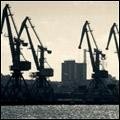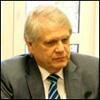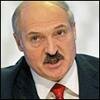Другие материалы рубрики «English»
-
 Belarus will divert cargoes to Russian seaports, Lukashenka says
Belarus will divert cargoes to Russian seaports, Lukashenka says
Belarus will divert most of its cargoes from Lithuanian and Latvian seaports to seaports in Russia`s Leningrad province, Alyaksandr Lukashenka said at a meeting with Aleksandr Drozdenko... -
 Opposition activists in Brest collecting signatures for implementing local border traffic agreement with Poland
Opposition activists in Brest collecting signatures for implementing local border traffic agreement with Poland
Activists of the "Tell the Truth!" movement in Brest have begun collecting signatures for a petition calling for implementing a Belarusian-Polish interstate agreement ...
- Latvia promises favorable conditions for Belarusian cargoes
- Another Malady Front member sentenced to 15 days in jail over attempt to splash Lenin statue with valerian tincture
- Lithuanian ambassador`s trip to Vilnius is not linked to Molotov cocktail attack, embassy says
- Latvia promises favorable conditions for Belarusian cargoes
- Minsk describes firebomb attack on Lithuanian embassy as malicious hooliganism
- Officials express satisfaction with results of Belarusian-Qatari economic talks in Minsk
- Belaya Rus holds convention at Palace of Republic in Minsk
- Opposition activists stage commemorative procession to Stalin-era massacre site"
- Listapad film festival kicks off in Minsk
- Opposition activists commemorate victims of Bolshevik terror at Kurapaty
English
Competition was limited and many democratic rights were not respected in parliamentary elections in Belarus
Competition was limited and many OSCE commitments on citizens' democratic rights to associate, to stand as candidates and to express themselves freely were not respected in the September 18-23 parliamentary elections in Belarus, OSCE observers say in a preliminary report issued on September 24.
 The elections were not administered in an impartial manner and the complaints and appeals process did not guarantee effective remedy, say the observers, who represent the OSCE Office for Democratic Institutions and Human Rights and the OSCE Parliamentary Assembly.
The elections were not administered in an impartial manner and the complaints and appeals process did not guarantee effective remedy, say the observers, who represent the OSCE Office for Democratic Institutions and Human Rights and the OSCE Parliamentary Assembly.
"This election was not competitive from the start," says Matteo Mecacci, head of the OSCE Parliamentary Assembly's short-term observation mission. "A free election depends on people being free to speak, organize and run for office, and we didn't see that in this campaign. We stand ready to work with Belarus to take the steps forward that are in our common interest."
"The lack of neutrality and impartiality on the part of election commissions severely undermines public confidence in the process," says Antonio Milososki, head of the long-term observation mission of the OSCE Office for Democratic Institutions and Human Rights. "Citizens should feel confident that their votes are counted as cast, but the lack of proper counting procedures or ways for observers to verify the results raises serious concerns."
While there was an increase in the number of candidates put forward by parties, prominent political figures who might have played a role remained in prison or were not eligible to register because of their criminal record, the observers says. Arbitrary administrative decisions also constrained the field of contestants, limiting voters' choices, the report says.
Despite improvements made to the Electoral Code in 2010 and 2011, Belarus' regulations do not adequately guarantee the conduct of elections in line with OSCE commitments and international standards, the observers say.
On a positive note, political parties could, for the first time, nominate contenders in constituencies where they had no regional office, which increased the number of political party nominations, the report says. Nonetheless, the overly technical application of the Electoral Code resulted in the exclusion of one in four nominees.
According to the report, the election campaign was barely visible throughout the four-week period. "Although the Constitution guarantees freedom of expression and there is a high number of media outlets, coverage of the campaign did not provide a wide range of views," the observers say. "Candidates who called for an election boycott had their free access to media coverage denied or censored. Media coverage focused on the President and government, with minimal attention given to candidates."
The observers note that while early voting and main voting day procedures were assessed positively, the process deteriorated considerably during the vote count. "A significant number of observers were not given a meaningful opportunity to observe the count and evaluated the process negatively in a significant number of the polling stations observed," the report says. "The continued lack of properly delineated counting procedures meant that an honest count could not be guaranteed." // BelaPAN




В настоящее время комментариев к этому материалу нет.
Вы можете стать первым, разместив свой комментарий в форме слева